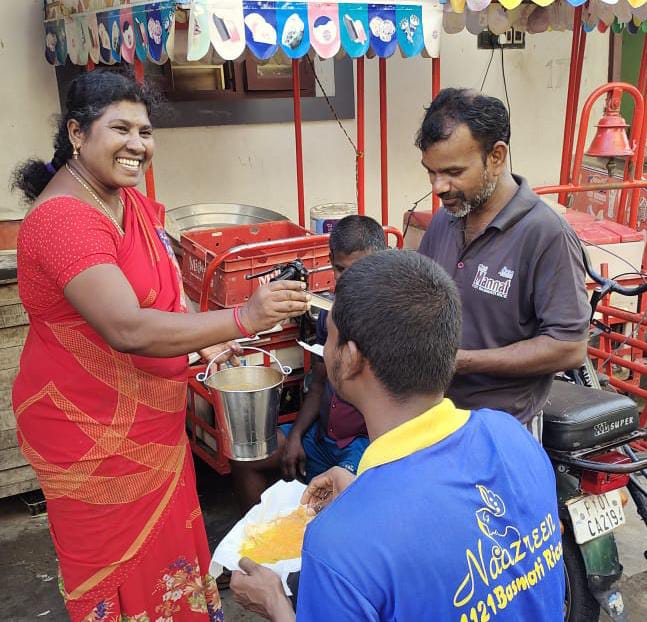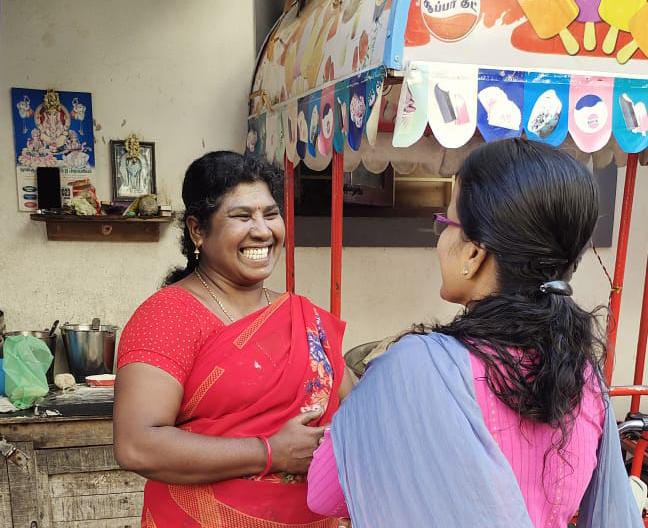Penned By Board Member Ms. Alo Pal
Our joint family lived a few blocks down the road from the Ashram and School main buildings here in Pondicherry. In those days, a cycle rickshaw stand stood just opposite the Ashram’s main gate. My sister, my cousin, and I used to walk up to the stand, and one of the rickshaw pullers used to drop us all home. We did not carry any money. The rickshaw puller used to walk us up the stairs. My grandmother would pay him and feed him. There used to be flower sellers; one sold roses and the other water lilies. Ma used to pay them and feed them. There was another lady who made papier mache dolls and animal figurines. Ma, a doll lover, always bought something from the ladies and fed them. Old housemaids who had left work used to drop by just to meet her, and Ma made them tea and fed them. I am sure what I describe here is a lived experience for many. Our culture left no one hungry. Daanam was intrinsic to our nature; compassion and understanding for the homeless and those of meager income were automatic. We especially knew that we were all victims of circumstance and we were no one to judge the circumstance of another. There was purity of intention in those who gave and dignity in those who received.
And yet, there crept a difference between my grandmother’s generation and mine. As I grew, I picked up a different set of values. There was dignity in doing an honest day’s work and earning one’s living. I never had sympathy for the able-bodied beggars on the street. I didn’t look at “asking” with tolerance, and therefore, subliminally eroded somewhere the impact of what I saw my grandmother do, and especially how she did it. I was a teenager, I did not worry about the world, I could afford this hardening of attitude, and then I grew up. I saw around me how even the best of intentions and business plans can ruin the fortunes of a family and trap them in debt. I acknowledged how mental health conditions prevented productivity. I saw the direction in which my latter insidious indoctrination was taking me was devoid of the compassion and humanity that I loved and respected immensely in my grandmother. Victims of the Partition, my maternal side of the family fell through difficult times after my grandfather left everything he possessed in East Pakistan. Wealth to penury: is but a stroke of bad luck away, often of circumstances beyond your control.
Today, I am older, and I have consciously changed my outlook toward daanam. I think of it as humbling and humane. When I saw Indrani’s eyes well up in tears as she thanked Sharana profusely for the loan she had got for her tiffin shop, I saw again dignity in receiving. She came from a family of decent income and brought 30 sovereigns of gold with her when she got married. She lived in Karaikudi with her husband and three children. Her husband worked in a hotel, and she worked at a textile shop. But they aspired to have their own business and went for the much-promoted Emu rearing, which failed. The 30 sovereigns of gold were lost. Soon thereafter, her husband’s kidney stones had to be treated. After that, twice getting into debt and paying hefty sums to agents, her husband went to Malaysia on contract, and both times had to abort the stay due to failing health. By this time, they were reduced to penury, and faced with mounting debt and given setback after setback, Indrani attempted suicide, rescued in the nick of time by her daughter. That is when they took a bold step to abandon Karaikudi and shift to Pondicherry, where some of Indira’s relatives lived. Once again, the intrinsic, age-old culture of accommodating near and dear ones ensured that her extended family arranged for their stay and helped them set up a tiffin shop. She heard of Sharana, and we estimated that she was a deserving candidate for a SEP loan to enhance her business. Her son has enrolled in our Digital Lab, and now, with an elevated business, she can earn a decent living and is steadily paying back her loans.

Indrani at her tiffin shop
It was an interest-free loan of 15,000 only. But it was also the assurance that our organization had her back. You might say that a loan is not a daan, and that is where I have to tell you that, if they can help it, everyone is happiest if they can help themselves. The difference is in your attitude towards those who need the help and how you give it. Sometimes, it is just a token gesture; sometimes money. But when able, the beauty is witnessing the dignity with which a person would want to regain control of his/her life.

Indrani’s happy interaction with our Social Worker












